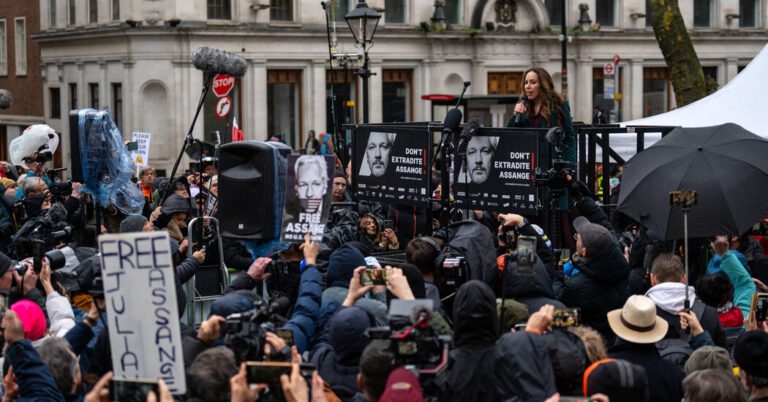
[ad_1]
The High Court in London ruled on Tuesday that Julian Assange, the embattled WikiLeaks founder, cannot be immediately extradited to the United States, saying American authorities must offer assurances about his treatment first, including over his First Amendment rights and protection from the death penalty.
The decision had been highly anticipated as the moment the court would decide if Mr. Assange had exhausted his challenges within British courts. Instead, in a nuanced decision, two judges determined that clarity on his fate would again be on hold.
In their ruling, the two High Court judges said that the court “will grant leave to appeal” on narrow grounds, “unless a satisfactory assurance is provided by the government of the United States of America.”
The court has given the United States three weeks “to give satisfactory assurances” that Mr. Assange “is permitted to rely on the First Amendment to the United States Constitution (which protects free speech), that he is not prejudiced at trial (including sentence) by reason of his nationality, that he is afforded the same First Amendment protections as a United States citizen and that the death penalty is not imposed.”
If those assurances are not given, then Mr. Assange will be granted a right to a full appeal hearing. If the United States does provide the requested assurances, there will be a further hearing on May 20 to decide if they “are satisfactory, and to make a final decision on leave to appeal.”
While the decision delays a final call on the process in the British courts, Mr. Assange’s legal team has also vowed to appeal to the European Court of Human Rights, which could also halt his removal.
Mr. Assange, 52, has been held in a high-security prison in southeastern London since 2019 as he has fought the extradition order. The United States has accused him of violating the Espionage Act with WikiLeaks’ 2010 publication of tens of thousands of classified military and diplomatic documents leaked by Chelsea Manning, an Army intelligence analyst.
As Mr. Assange’s case has drawn out over the years, it has become highly charged politically, raising First Amendment issues and alarming advocates of media freedom.
Mr. Assange moved to Britain in late 2010 from Sweden. The Swedish police issued an international arrest warrant for him later that year over sexual assault accusations.
In June 2012, he was granted political asylum in the Ecuadorean Embassy in London — where he stayed for the next seven years.
Sweden dropped its case against Mr. Assange. He was thrown out of the embassy in 2019, and shortly after, the United States announced an indictment against him, charging him with 18 counts of violating the Espionage Act by participating in a criminal hacking conspiracy and by encouraging hackers to steal secret material.
He was promptly arrested, and has been seeking to halt his removal to the United States through British courts ever since.
In 2021, a British judge denied the extradition order for Mr. Assange, ruling that he was at risk of suicide if sent to an American prison. But the High Court later reversed that decision based on assurances from the Biden administration that he would not be held in the United States’ highest-security facility and that, if convicted, he could serve his sentence in Australia.
By 2022, Priti Patel, who as Britain’s home secretary was responsible for the country’s borders and security, had approved the extradition request — and Mr. Assange’s legal team fought that as well.
When a lower-court judge denied their request that he be allowed to appeal, they asked the High Court to overturn that move.
Mr. Assange’s lawyers say that he could face up to 175 years in prison if convicted, although lawyers for the United States government have said that he was more likely to be sentenced to four to six years.
During a High Court hearing in the case, his lawyer Edward Fitzgerald told the judges, Victoria Sharp and Jeremy Johnson, that “Mr. Assange was exposing serious criminality” by publishing the leaked documents.
Mr. Fitzgerald said at the hearing that during the Trump administration, C.I.A. officials had discussed plans to assassinate Mr. Assange while he was sheltering in the Ecuadorean Embassy in London — an accusation reported by Yahoo News in 2021 and denied by the Trump administration. It was the first time the accusation had been mentioned in a hearing on Mr. Assange’s extradition, and his legal team said they had proof of the discussions.
Mr. Assange did not appear in the courtroom, despite having been granted rare permission to do so for the first time since 2021. His lawyers told the court that he was not well enough to attend or even to attend via video link from prison.
At a news briefing in February, his wife, Stella Assange, said that his legal team would “definitely and immediately file an application” with the European Court of Human Rights if blocked from further appeals in Britain, and that he would ask for an “injunction to stop the U.K. from extraditing him.”
[ad_2]